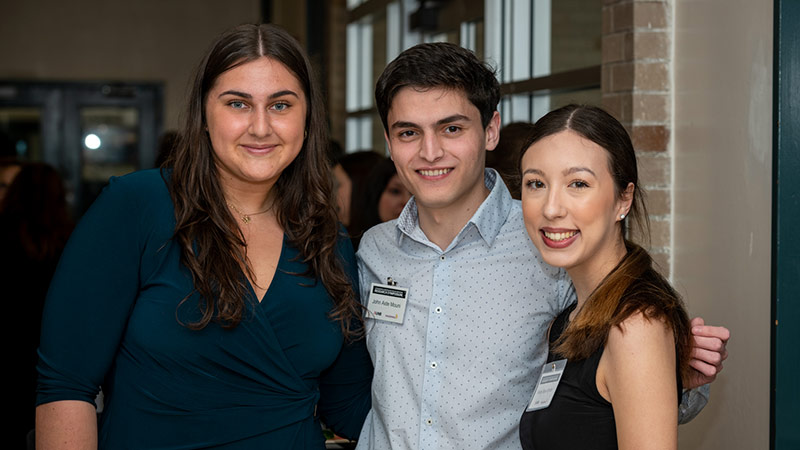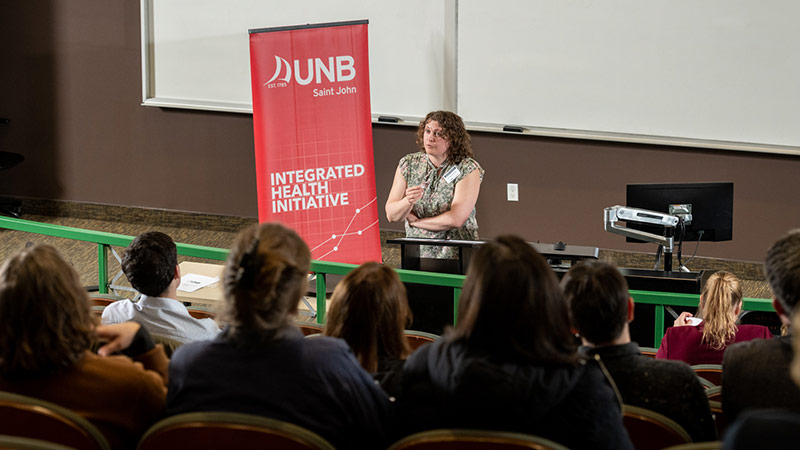UNB hosts inaugural AstraZeneca Integrated Health Initiative Research Symposium
Author: Kayla Cormier
Posted on Apr 25, 2024
Category: Research , UNB Saint John

The University of New Brunswick (UNB) recently hosted its first annual Integrated Health Initiative (IHI) Research Symposium in partnership with AstraZeneca. This two-day event took place on the Saint John campus April 11 and 12.
Group presentations and poster presentations provided attendees a chance to engage with students and ask questions about their research. Honours students from the first full four-year bachelor of health cohort presented the results of their year-long community-based projects and thesis research.
“These students are the health reformers of the future,” said Dr. Petra Hauf, UNB’s provost and vice-president academic. “Their presentations show that they are well on their way to becoming excellent researchers and healthcare providers for our province and beyond.”
Allison Orr’s talk about the need for resource teachers in navigating care for students with Type 1 Diabetes stood out as an important topic. Attendees were also inspired by Eniola Lawal’s impressive research into a nature-inspired drug candidate for the treatment of Non-Hodgkin Lymphoma.
Students tackled some of the real issues facing New Brunswick’s health sector. Some examples include evaluating the experience of unattached older adults in New Brunswick; examining the Impact of a Genetic Etiology on Clinical Outcomes in Children Living with Pediatric Epilepsy; and looking at newcomers and their experience with urban health in Saint John.
Guest speakers included thought leaders Ilias Iliopoulos, head of payer engagement and strategic partnerships with AstraZeneca Canada Inc.; Dr. Bryn Robinson, department of health, Government of New Brunswick; and Dr. Michael Ungar, Ph.D., founder and director of the Resilience Research Centre at Dalhousie University.
Dr. Bryn Robinson gave an engaging and inspiring talk about the communication of scientific data–namely, making science more accessible through creative mediums. Her lecture was a call to action to embrace new languages of science communication.
“Yes, I am talking about art,” she laughed, as she flipped through slides of various examples of #SciArt–that is, creative works that bridge the gap between art and science.
Some examples included in her presentation were works like “Fashioning Cancer: The Correlation between Destruction and Beauty,” “Cattening the Curve” and a visual work that captures the experience of vertigo.

Dr. Michael Ungar spoke on the science of resilience and personal pathways to resilience in the context of healthcare.
In his lecture, he demonstrated how resilience is a negotiated process that enhances wellbeing and social responsibility and in turn, improves quality of life for people navigating the healthcare system.
“The more flexibility our systems have, the better we are going to be able to help people,” he said.
Dr. Ungar advocates for moving away from “one-system thinking,” particularly by considering social connections when providing care for patients. This, he argues, is a more sustainable approach and increases both individual and institutional agility during crises.

“The first annual AstraZeneca IHI Research Symposium was a great success,” said Heather Campbell, director of IHI. “We learned so much from the students presenting their research–it really shows that UNB is shaping the future leaders in the health sector.” she stated.
Banner photo: Honours students Allison Orr on the left, John Mouni and Kiara Smith on the right.
